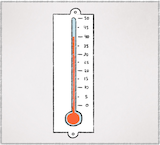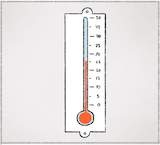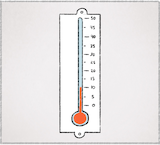


อันนี้คืออี่หยัง อันนี้เบิ่งแล้วกะสิเป็นหน้าฮ้อน หลือว่าลึดูฮ้อนเนาะ
อาดสิเป็นลึดูแล้งลึดูฮ้อนเนาะ เพาะว่าเบิ่งองสามาแล้วกะสูงเติบ ตั้งสี่สิบองสา
เบิ่งลักสะนะ เบิ่งซงแล้วฮ้อนคัก ฮ้อนคักอี่หลี
สำหลับอยู่พากอี่สานกะสิฮ้อนเติบเนาะ สี่สิบองสาหนิกะสิเฮ็ดให้ผิวไหม้ได้จักหน่อยพุ้นแหล้ว ขั้นตากแดดหลายๆ เนาะ
แล้วหน้าฮ้อนหนิกะสิอยู่ปะมานเดียนมีนาเมสาไปเนาะ กะสิไปเลี้ยยๆ แล้วแต่มันสิฮ้อน ฮอดใส หน้าฮ้อนหลือว่าหน้าแล้ง กะสิอยู่ซ้วงปะมานนี้เนาะขึ้นไป หลือว่าจาก เลิ้มจากเดียนนี้ขึ้นไปเนาะ
19
อันนี้เป็นจั่งใด อากาดเป็นจั่งใด อันนี้กะสิเป็น อาดสิอากาดบ่ฮ้อนหลาย บ่หนาวหลาย
ปะมานจักองสาหละหนิ ปะมานยี้สิบห้าองสาเนาะ กะบ่ถือว่าฮ้อนหลายหนาวหลาย อากาดกะสิพอดี
แต่ว่าสำหลับคนอี่สานหลือว่าคนไทยแล้วกะ ขั้นยี้บห้าองสากะสิหนาวน้อยๆ เย็นน้อยๆ เนาะ บ่ฮ้อนหลาย อากาดกำลังเย็นๆ
20
อันนี้อากาดเป็นจั่งใด ตอนนี้อากาดกะซงหนาวหลาย
สำหลับคนไทยหลือว่าคนอี่สานเนาะ อากาดแบบนี้หนาวคัก เพาะว่าสิบองสานี้คือหนาวโพดโพ หนาวคัก หนาวแน่ หนาวอี่หลี
ทุกคนต้องห่มผ้า หลือว่าใส่เสี้ยแขนญาวหลายโต ซ้อนกันหลายๆ โตเนาะ
ขั้นเป็นหน้าหนาวในพากอี่สาน กานที่ทุกคนสิได้เฮ็ดกะคือ ตั้งไฟ ตั้งไฟ หลือว่าจุดไฟ หลือว่าก่อกองไฟ แล้วกะมานั่งล่วมกัน หลือว่าอาดสินั่งอยู่พุเดียวกะได้
แล้วกะไปนั่งฝิงไฟ หลือว่านั่งข้างๆ กองไฟ เพื่อที่ว่าสิให้มันเกิดความฮ้อนในโต บ่ให้มันหนาวคัก บ่ให้มันหนาวหลาย
แล้วบางคนกะสิใส่เสี้ยแขนญาวหลายโต หลือว่าสามสี่โต ห้าโต แล้วแต่คนสิใส่เนาะ เพาะว่ามันหนาวหลายคัก
ต้องเฮ็ดให้โตเจ้าของอบอุ่น หลือว่าบ่ให้มันเย็น บ่ให้มันหนาวหลายเนาะ
Link to overview page
Link to dictionary
| Isaan | Pronunciation | Tones | Thai | English/Notes |
|---|---|---|---|---|
| อัน | an | M | อัน | 1. thing, object 2. general clf. for objects |
| นี้ | ni: | HF | นี้ | 1. this 2. here |
| คือ | khʉ: | HR | คือ | 1. to be, to resemble, like, as 2. why {บักหล้าคือบ่เก็บโต่ะแน่ = [addressing a young boy] Why haven't you cleared the table?} |
| อี่หยัง | i:-yaŋ | H-M | อะไร | 1. what {นี้คืออี่หยัง = What is this?} {มื้อนี้เจ้าเฮ็ดอี่หยัง = What are you doing today?} {กินเข้างายกับอี่หยัง = What did you have for breakfast?} 2. something, anything, (in negations) nothing {บ่ต้องเฮ็ดอี่หยังอีกเลยนอกจากใส่ปุย = [we] don't need to do anything besides adding fertilizer} |
| เบิ่ง | bəŋ | H | ดู | 1. to look at, to see, to watch {เบิ่งโทละทัด = to watch TV} {เบิ่งหนัง = to watch a movie} 2. to guess {เบิ่งซงแล้ว ... = [I] guess / from what it looks like ...} |
| แล้ว | lɛ:o | HF | แล้ว | 1. finished 2. already 3. and then, and next (especially แล้วกะ) 4. auxiliary for past tense |
| กะ | ga | M | ก็ | 1. then, consequently 2. also |
| สิ | si | M | จะ | future tense auxiliary {เขากำลังสิตื่น = he's about to wake up} {สิไปตะหลาด = [I'm] going to the market} |
| เป็น | pen | M | เป็น | 1. to be, to exist 2. to be able to 3. to suffer, sth. happens to 4. เป็นหญัง[...]คือ in initial position: why? {เป็นหญังเขากะคือแปงฟัน = Why is he brushing his teeth?} {เป็นหญังเคี่ยงบินมันคือสิตก = Why is the airplane falling down?} |
| หน้าฮ้อน | na:-hɔ:n | LF-HF | หน้าร้อน | summer, hot season |
| หลือ | lʉ: | M | หรือ | or |
| ว่า | wa: | H | ว่า | 1. that, as {คำว่า X = the word X} 2. to say |
| ลึดูฮ้อน | lʉ-du:-hɔ:n | H-M-HF | ฤดูร้อน | summer, hot season |
| เนาะ | nɔ | H | เนาะ | final particle: makes the statement softer, looking for agreement |
| อาด | a:t | LF | อาจ | 1. might, may, will 2. likely |
| ลึดูแล้ง | lʉ-du:-lɛ:ŋ | H-M-HF | ฤดูแล้ง | dry season |
| เพาะว่า | phɔ-wa: | H-H | เพราะว่า | because |
| องสา | oŋ-sa: | M-M | องศา | degree (Celsius) |
| มา | ma: | HR | มา | 1. to come 2. auxiliary expressing action towards the present or focal time {กะคุเฮ็ดมาจากอี่หยัง = What is the bucket made of?} {แล้วเขากะเก็บเงินจากพุนั้นมา = and then she takes the money of that person} |
| สูง | su:ŋ | M | สูง | high, tall |
| เติบ | tə:p | LF | intensifier: very, much {เว้ากันโดนเติบ = to talk a long time} | |
| ตั้ง | taŋ | HF | ตั้ง | as much as, up to {เขากินตั้งสามขวด = he's drunk as much as three bottles} |
| สี่สิบ | si:-sip | H-M | สี่สิบ | fourty |
| ลักสะนะ | lak-sa-na | H-M-H | ลักษณะ | feature, characteristic, quality |
| ซง | soŋ | HR | ทรง | 1. shape, form 2. as if, like Notes: translation to be confirmed |
| ฮ้อน | hɔ:n | HF | ร้อน | hot |
| คัก | khak | H | intensifier: very, very much | |
| อี่หลี | i:-li: | H-M | จริง | intensifier: really Notes: pronunciation: also realized as อี่หลิ |
| สำหลับ | sam-lap | M-M | สำหรับ | for |
| อยู่ | yu: | H | อยู่ | 1. to be (located) at 2. yet, still 3. auxiliary indicating continuous or progressive action {ทอดปาอยู่ในกะทะ = (in the process of) frying a fish in the pan} {แม่กำลังเมี้ยนเฮียนอยู่ = mother is cleaning/tidying up the house} |
| พาก | pha:k | HF | ภาค | part {พากอี่สาน = Isaan (as a region)} {พากกาง = Central Thailand} |
| อี่สาน | i:-sa:n | H-M | อีสาน | Isaan {คนอี่สาน = Isaan person} |
| หนิ | ni | M | นี่แหละ, เหรอ/หรอ | 1. particle used to emphasize a statement or form (or add to) a question {เป็นตาแซบคือหญังหนิ = it's really tasty} {เคี่ยงพอเท่าๆ หนิ = the [radio] is appropriately sized (i.e., not too large)} 2. variant of นี้ = this Notes: translation to be determined; maybe sometimes like Thai นี่แหละ; other examples given: อยู่ใสหนิ อยู่ตลาดหนิ กินเข้าไป่หนิ |
| เฮ็ด | het | H | ทำ | to do, to make |
| ให้ | hai | LF | ให้ | 1. to give {หมอกำลังเอายาให้คนป่วยกิน = the doctor is giving the patient medicine} 2. for 3. to allow, to be allowed |
| ผิว | piu | M | ผิว | skin |
| ไหม้ | mai | LF | ไหม้ | 1. to burn, to catch fire 2. to be on fire 3. burnt |
| ได้ | dai | HF | ได้ | 1. can 2. to get, to obtain 3. before verb: indicating past tense 4. บ่ได้ + verb: not |
| จัก | jak | M | จัก | 1. answer to a question: [I] don't know, don't know exactly, [I'm] not sure {พุซายคนนี้เขาเถ้าไป่ จัก จักเถ้าหลือบ่เถ้า เบิ่งบ่ค่อยออก = Is this man here already old? I don't know. I can't see clearly whether he's old or not.} {เขาเว้ากันอยู่ใส จักคือกัน = Where are they talking? I don't know either.} 2. exact(ly), what exactly {จักต้มอี่หยังกะบ่ฮู้ = I don't know what (exactly) he is cooking} {บ่ลู้คือกันจักปาอี่หยัง = I don't know either what kind of fish this is} 3. how much/many? {ต้นไม้มีจักต้น = How many trees are there?} {ตอนนี้จักโมงแล้ว = What time is it now?} {มือของเฮานี้สิมีจักนิ้ว = How many fingers do our hands have?} 4. a bit, a little bit {จักหน่อย/จักหน่อยหนึ่ง = a bit, a little bit} |
| หน่อย | nɔ:i | H | หน่อย | a bit, a little bit, not much {as in หน่อยเดียว, หน่อยหนึ่ง} |
| พุ้นแหล้ว | phun-lɛ:o | HF-LF | นู่นแหละ | auxiliary for emphasis at the end of a phrase Notes: variant of พุ้นหละ |
| ขั้น | khan | LF | เมื่อ | when, if |
| ตาก | ta:k | LF | ตาก | to dry in the sun, to expose to the sun |
| แดด | dɛ:t | LF | แดด | sunlight |
| หลาย | la:i | M | เยอะ, มาก | many, much, very |
| ปะมาน | pa-ma:n | M-HR | ประมาณ | 1. about, approximatively 2. to guess, to estimate |
| เดียน | di:an | M | เดือน | month Notes: pronunciation: also realized as เดือน, in particular before the names of months |
| มีนา | mi:-na: | HR-HR | มีนาคม | March |
| เมสา | me:-sa: | HR-M | เมษายน | April |
| ไป | pai | M | ไป | 1. to go 2. auxiliary indicating action extending into the future |
| เลี้ยยๆ | li:ai | HF | เรื่อยๆ | continuously Notes: pronunciation: also realized as เลื้อยๆ |
| แล้วแต่ | lɛ:o-tɛ: | HF-H | แล้วแต่ | up to, depending on |
| มัน | man | HR | มัน | it (also used to refer to people) |
| ฮอด | hɔ:t | HF | ถึง | 1. to arrive, to attain {ฮอดจุดหมายปายทาง = (airplane, train etc.) to arrive at one's destination} {มันทันได้ฮอดหกโมงอยู่ = it's not yet 6 o'clock} 2. to, at {ผมญาวฮอดบ่าไหล่เอาโลด = long hair down to the shoulders} 3. about {บ่ได้เว้าฮอด = [I] haven't talked about [this]} {คนที่เฮาเว้าฮอดวั่งหั้นหละ = the person we've just talked about} |
| ใส | sai | M | (ที่)ไหน | 1. where? {สิไปใส = Where are [you] going?} {มาแต่ใส = Where are [you] coming from?} {กะทะอยู่ใส = Where's the pan?} 2. somewhere, anywhere {ใสกะได้ = anywhere, wherever you like} |
| หน้าแล้ง | na:-lɛ:ŋ | LF-HF | หน้าแล้ง | dry season |
| ซ้วง | su:aŋ | HF | ช่วง | period |
| ขึ้น | khʉn | LF | ขึ้น | 1. to go up, to increase 2. sun: to rise {ตะเว็นกำลังขึ้น = the sun is rising} 3. more 4. bus/train etc.: to get on, to board {พุโดยสานขึ้นลดไฟเบิดแล้ว = all passengers have boarded the train} |
| จาก | ja:k | LF | จาก | 1. from {... เฮ็ดมาจากอี่หยัง = ... is made from what?} 2. to depart |
| เลิ้ม | lə:m | HF | เริ่ม | to begin, to start |
| จั่งใด | jaŋ-dai | H-M | ยังไง, แบบไหน | how, in what manner {บักนาวมันมีลดซาดจั่งใด = Lime fruits have what kind of taste?} {เขาปิดแอจั่งใด = How is he switching off the A/C?} {เทียนใซ้จั่งใด = How's a candle used?} {สิใซ้จั่งใด = how is [it] used?} |
| อากาด | a:-ga:t | M-LF | อากาศ | 1. weather, climate 2. air |
| บ่ | bɔ: | H | ไม่ | 1. no, not 2. question particle, transforming a statement into a question Notes: spelling exception in line with common usage on social media |
| หนาว | na:o | M | หนาว | cold, chilly (personal sensation) |
| หละ | la | M | แหละ, ล่ะ | 1. auxiliary for emphasis at the end of a phrase 2. auxiliary to create a follow-up question: And what about ... ? {แล้วลดคันที่สองหละ = And what about the second car?} |
| ยี้สิบ | yi:-sip | HF-M | ยี่สิบ | twenty |
| ห้า | ha: | LF | ห้า | five |
| ถือ | thʉ: | M | ถือ | 1. to hold 2. to carry 3. to regard as, to consider {สี่สิบองสาถือว่าฮ้อน = 40 degrees Celsius is considered hot} |
| พอดี | phɔ:-di: | HR-M | พอดี | 1. to fit well 2. appropriate, just enough, just right {กะจกบานบ่ใหญ่ กะจกบานพอดี = not a large window, just right} {พอดีมือของเฮา = just right for his hand} 3. just in time, at the right moment, just this moment {แล้วพุซายคนนี้กะญ่างมาพอดี = and the man has come just now} |
| แต่ว่า | tɛ:-wa: | H-H | แต่ว่า | 1. but 2. only {ฮู้แต่ว่าเขายืนอยู่พุเดียว = I only know that he's standing there by himself} |
| คน | khon | HR | คน | person, people |
| ไทย | tha:i | HR | ไทย | Thai {ปะเทดไทย = Thailand} {คนไทย = Thai (person)} |
| ยี้บ | yi:p | HF | ยี่สิบ | twenty |
| น้อย | nɔ:i | HF | น้อย | 1. few, little 2. small |
| เย็น | yen | M | เย็น | cold, cool (air, objects) |
| กำลัง | gam-laŋ | M-HR | กำลัง | auxiliary indicating continuous or progressive action |
| ตอนนี้ | tɔ:n-ni: | M-HF | ตอนนี้ | now |
| แบบ | bɛ:p | LF | แบบ | 1. example, model, kind 2. style, form, pattern, design |
| สิบ | sip | M | สิบ | ten |
| โพดโพ | pho:t-pho: | HF-HR | มากๆ | a lot, many/much |
| แน่ | nɛ: | H | แน่, บ้าง | 1. some, somewhat 2. final particle, used to ask for examples (similar to Thai บ้าง at the end of a question) {หม้อใซ้เฮ็ดอี่หยังได้แน่ = What (different things) can a pot be used for?} {น้ำอัดลมซื้อได้อยู่ใสแน่ = Where/in which places can one buy soft drinks?} 3. final particle, when giving examples {มีเทิงส้งแน่ มีเสี้ยแน่ มีเกิบแน่ = there are trousers, shirts, shoes etc.} 4. final particle, used to give a command {ไปปิดหน้าต่างให้แน่ = Close the window!} 5. final particle, acting as an intensifier, especially in the pattern ... คัก ... แน่ {สูงคักสูงแน่ = very high} {ญ้องเฮาคัก ญ้องเฮาแน่ = [he's] praising me a lot} |
| ทุก | thuk | H | ทุก | every Notes: also pronounced ทุ as in ทุมื้อๆ = everyday, always |
| ต้อง | tɔŋ | HF | ต้อง | to have to, must |
| ห่ม | hom | H | ห่ม | to cover, to wrap |
| ผ้า | pha: | LF | ผ้า | 1. clothes 2. cloth |
| ใส่ | sai | H | ใส่ | 1. to put something in/on {เขาใส่บักพิกในกวยเตียวหลาย = he's putting a lot of chili in his noodle soup} {เขาบีบยาสีฟันใส่แปงสีฟัน = he squeezes toothpaste on the toothbrush} {ก่องเอาไว้ใส่ของ = boxes are there to put stuff in} 2. to wear (clothes) {เขาใส่เสี้ยแขนญาว = he's wearing a long-sleeve} 3. directed at {เอิ้นใส่กัน = to call each other/to say to each other} {หมามันเห่าใส่แมว = the dog barks at the cat} {ล้องเพงใส่ไม = to sing into the microphone} {เขากำลังซี้มือไปใส่พุซาย = she's pointing at the man} |
| เสี้ย | si:a | LF | เสื้อ | shirt |
| แขน | khɛ:n | M | แขน | arm |
| ญาว | ɲa:o | HR | ยาว | long |
| โต | to: | M | ตัว | 1. body, self 2. clf. for animals, characters/letters/consonants, appliances, clothes (e.g., pairs of trousers, shirts) |
| ซ้อน | sɔ:n | HF | ซ้อน | to pile up, to put on, to lay on top of, to stack {เอาถ้วยวางซ้อนกัน = to pile up/stack bowls} {พุซ้อน = passenger, e.g., of a motorbike or tuk tuk} |
| กัน | gan | M | กัน | mutual, each other, with another, together {เขากำลังนั่งเว้ากัน = they're sitting and talking} {เขาสองคนฮักกัน = they love each other} {ปาสองโตนี้ ใหญ่ห่างกันหลายบ่ = These two fish here, are they very different in size (from each other)?} {ต่างกัน = to be different (from each other)} {ก่องอันไหนหนักกว่ากัน = Which box is heavier (than the other(s))?} |
| หน้าหนาว | na:-na:o | LF-M | หน้าหนาว | winter, cold season |
| ใน | nai | HR | ใน | in, within |
| กาน | ga:n | M | การ | prefix indicating the action of ... |
| ที่ | thi: | H | ที่ | 1. that, which {คนที่ยืนอยู่ฝั่งขวา = the person which is standing on the right = the person standing on the right} {เว้าคำที่บ่สุพาบ = to speak words which are impolite = to speak impolitely} 2. for ordinal numbers {ที่สาม = third} |
| ตั้ง | taŋ | HF | ตั้ง | to set/put up, to install, to establish, to erect {เขาตั้งนาลิกาปุกตอนสองโมงเซ้า = he sets the alarm clock to eight o'clock in the morning} {พัดลมตั้งโต่ะ = table fan} {ทะนาคานมันสิไปตั้งไว้อยู่ซู่หม้องเอาโลด = banks are [established/can be found] everywhere!} {ตั้งไฟ = to set up a fire} |
| ไฟ | fai | HR | ไฟ | 1. fire, flame 2. electricity, power 3. light |
| จุด | jut | M | จุด | 1. to light sth. {จุดธูป = to light an incense stick} {จุดเทียน = to light a candle} 2. point, place {จุดเป้าหมาย = destination (e.g., of a trip)} |
| ก่อ | gɔ: | H | ก่อ | to light a fire |
| กองไฟ | gɔ:ŋ-fai | M-HR | กองไฟ | bonfire, campfire |
| นั่ง | naŋ | H | นั่ง | to sit |
| ล่วมกัน | lu:am-gan | H-M | ร่วมกัน | together Notes: should this be ล้วมกัน? |
| พุเดียว | phu-di:ao | H-M | คนเดียว | 1. alone, by oneself {เขากำลังยืนอยู่พุเดียว = she's standing by herself} {เขานั่งอยู่พุเดียว = he's sitting by himself} 2. one person |
| ฝิงไฟ | fiŋ-fai | M-HR | to warm oneself before the fire | |
| ข้าง | kha:ŋ | LF | ข้าง | 1. side {มีหูจับสองข้าง = there are handles on both sides} 2. next to {วางอยู่ข้างๆ ก่องใบใหญ่ = it's placed next to the large box} {เขายืนอยู่ข้างๆ อีกพุหนึ่ง = he's standing next to another person} 3. clf. for body parts which come in pairs (eyes, ears, legs etc.) {เขามีตาสองข้าง = she has two eyes} |
| เพื่อที่ | phʉ:a-thi: | H-H | เพื่อที่ | in order to, so that Notes: the vowel เอือ is likely to be a Thai loan |
| เกิด | gə:t | LF | เกิด | 1. (often together with ขึ้น) to happen, to arise, to take place {เกิดอี่หยังขึ้น = what is happening?} {บ่มีหญังเกิดขึ้น = nothing's happening} 2. to be born 3. to grow {หนวดกะคือสิเกิดอยู่ใต้ดัง = a moustache grows below the nose} |
| ความฮ้อน | khwa:m-hɔ:n | HR-HF | ความร้อน | heat Notes: pronunciation: also realized as ความล้อน |
| บาง | ba:ŋ | M | บาง | 1. some {สัดบางโตบ่มีขา = some animals don't have legs} {บางคนสิมักกินกวยเตียวแทนเข้า = some people like to eat noodle soup instead of rice (dishes)} {บางสิ่งบางอย่าง = something, anything} 2. thin |
| สาม | sa:m | M | สาม | three |
| สี่ | si: | H | สี่ | four |
| เจ้าของ | jao-khɔ:ŋ | HF-M | เจ้าของ | 1. personal pronoun: oneself 2. owner |
| อบอุ่น | op-un | M-H | อบอุ่น | warm, comfortably warm |